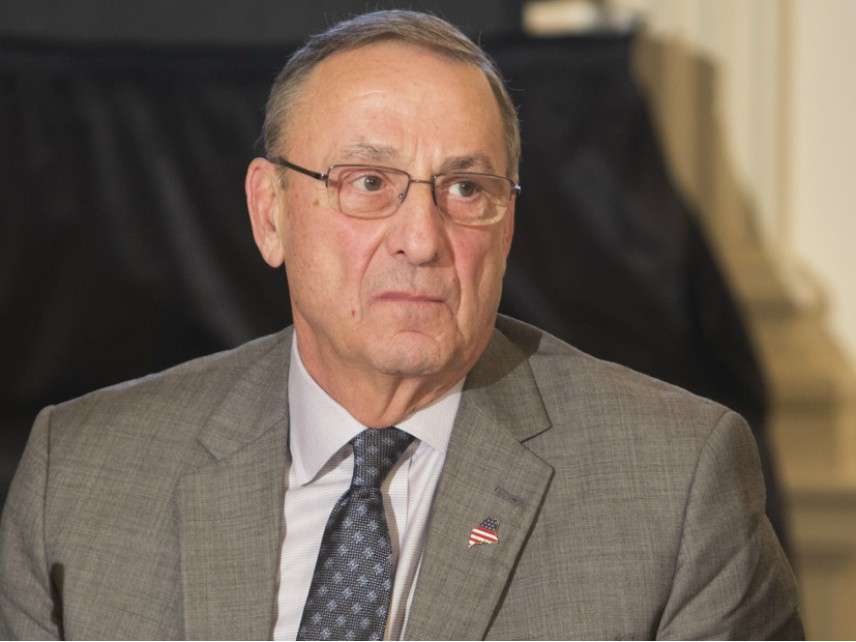Maine Legislators Override Governor's Veto of Marijuana Legalization
Paul LePage's obstructionism has delayed the establishment of a legal recreational market.

For the last year and a half, Maine's governor, Paul LePage, has been blocking implementation of a 2016 ballot initiative that legalized marijuana for recreational use. Yesterday state legislators showed their patience with LaPage's objections had been exhausted, overriding his veto of a bill aimed at creating a system to license and regulate commercial production and distribution of cannabis. The vote was 109 to 39 in the House and 28 to 6 in the Senate, well in excess of the two-thirds required.
LePage's April 27 veto message made it clear that he is implacably opposed to the marijuana policy that voters endorsed when they approved Question 1 in 2016. "Under federal law, marijuana is a Schedule 1 controlled substance," he wrote. "The federal government has deemed that marijuana has a high potential for abuse and has no currently accepted medical use in treatment in the United States. In Maine, doctors cannot legally prescribe marijuana to patients; they only 'certify' its use. Possession of any amount of marijuana under federal law is a misdemeanor crime. In 2011, I took an oath to support the Constitution of the United States, and I cannot in good conscience support a law that, on its face, violates federal law."
While anyone who grows or sells marijuana is committing a federal felony, it is less clear that officials who license and regulate marijuana businesses are thereby violating the Controlled Substances Act. Arguably they are simply certifying that the businesses have met the requirements to escape punishment under state law. Assuming that the CSA does prohibit licensing and regulation of the marijuana industry, it is clearly at odds with the federalist principles embodied in the 10th Amendment, which let each state decide for itself how to deal with production and distribution of cannabis within its borders. Presumably that is one reason why even Maine legislators who opposed legalization are determined to follow the will of the state's voters.
The bill approved yesterday, LD 1719, does second-guess voters in some respects. While Question 1 allowed home cultivation of up to six flowering plants at a time, LD 1719 draws the line at three. Legislators added an excise tax of $335 per pound (about $21 per ounce), payable by growers, to the 10 percent retail sales tax described in Question 1. They increased restrictions on participation in the industry for the first three years, requiring that licensees be Maine residents and taxpayers for at least four years.
The bill eliminates provisions allowing "marijuana social clubs" where cannabis can be bought and consumed, a significant step backward in light of the problems that other states have encountered after legalizing the sale of marijuana without legalizing places to use it. In the absence of marijuana social clubs, consumption will be permitted only "on private property" that is "not generally accessible by the public" with the owner's explicit permission.
"We are grateful that regulators can now—after months of undue delay—finally begin moving forward with the process of licensing adult use marijuana sales and regulating this retail market," said Paul Armentano, deputy director of the National Organization for the Reform of Marijuana Laws. But he added that "it is unfortunate that lawmakers felt it necessary to amend and repeal other important provisions of Question 1…in what ultimately was futile effort to curry favor with the governor."
While possession, sharing, and home cultivation have been legal in Maine since last year, LePage's obstructionism has delayed the opening of marijuana farms and stores. The legislature has charged the state Department of Administrative and Financial Services with writing marijuana regulations, which the legislature has to approve next year. State-licensed marijuana merchants are not expected to start serving recreational customers until the spring of 2019.
That schedule puts Maine well behind the three other states that legalized marijuana in 2016. Legal recreational sales began in Nevada last year and in California last January. They are expected to start in Massachusetts this summer.


Show Comments (37)